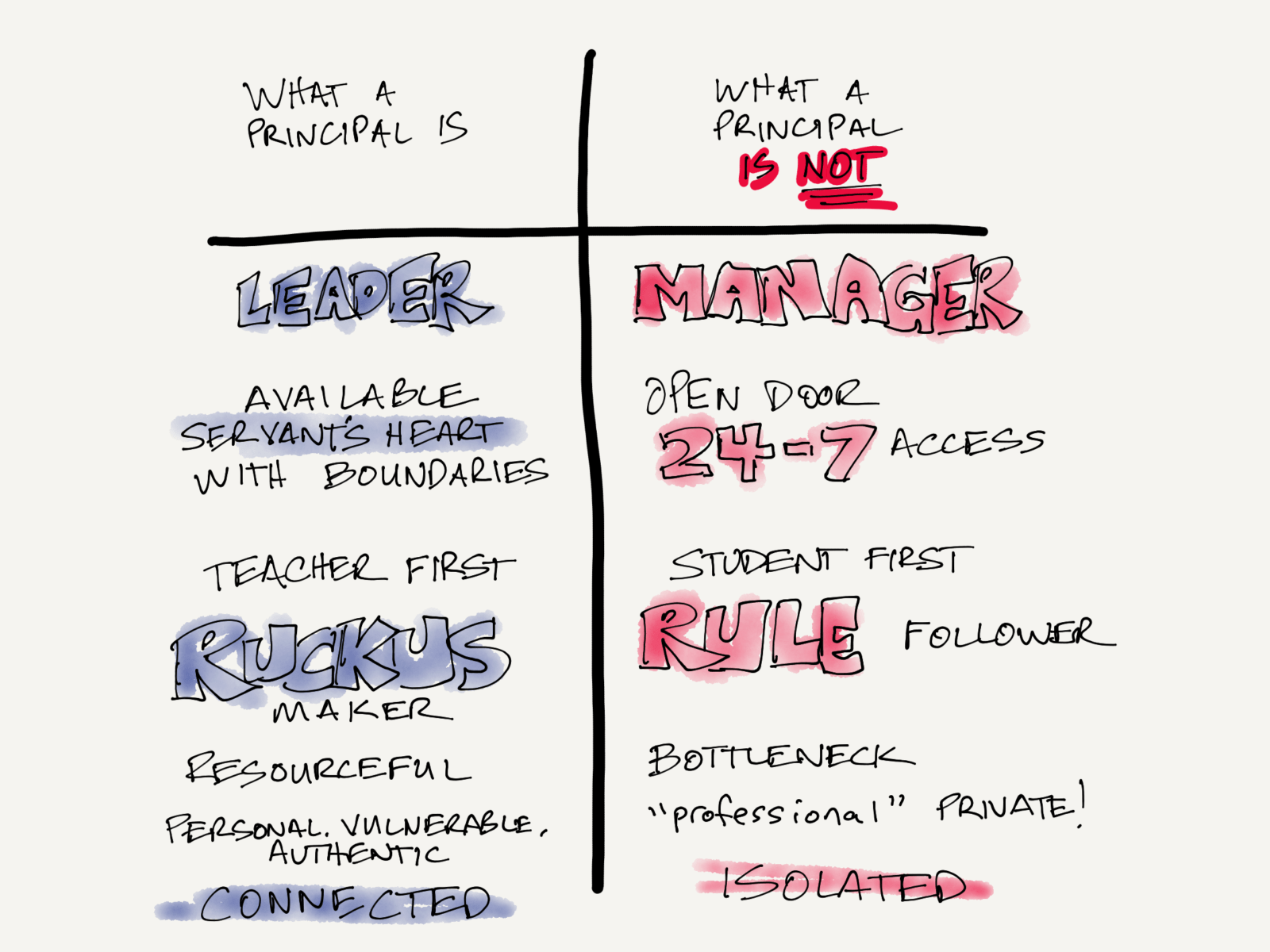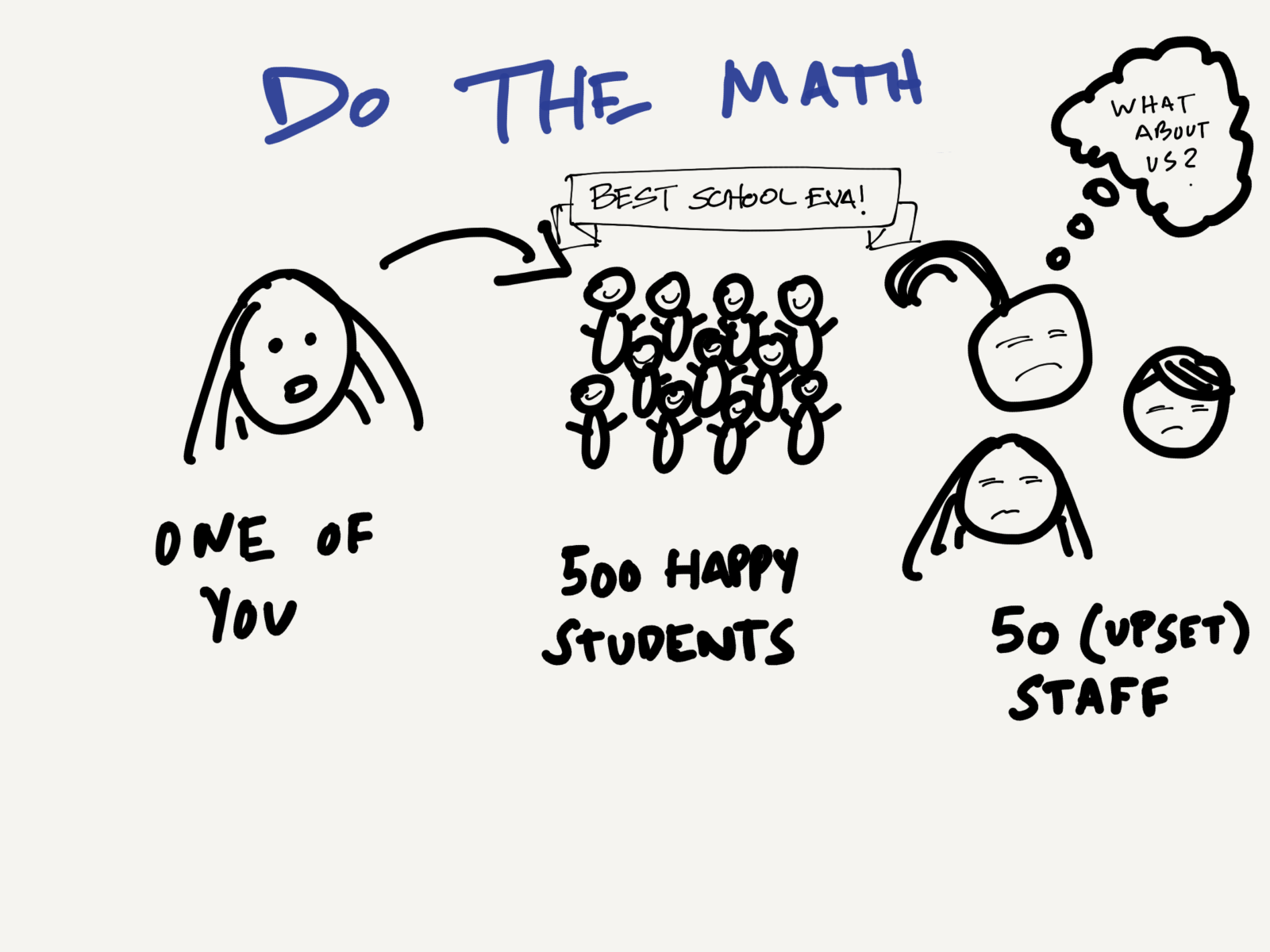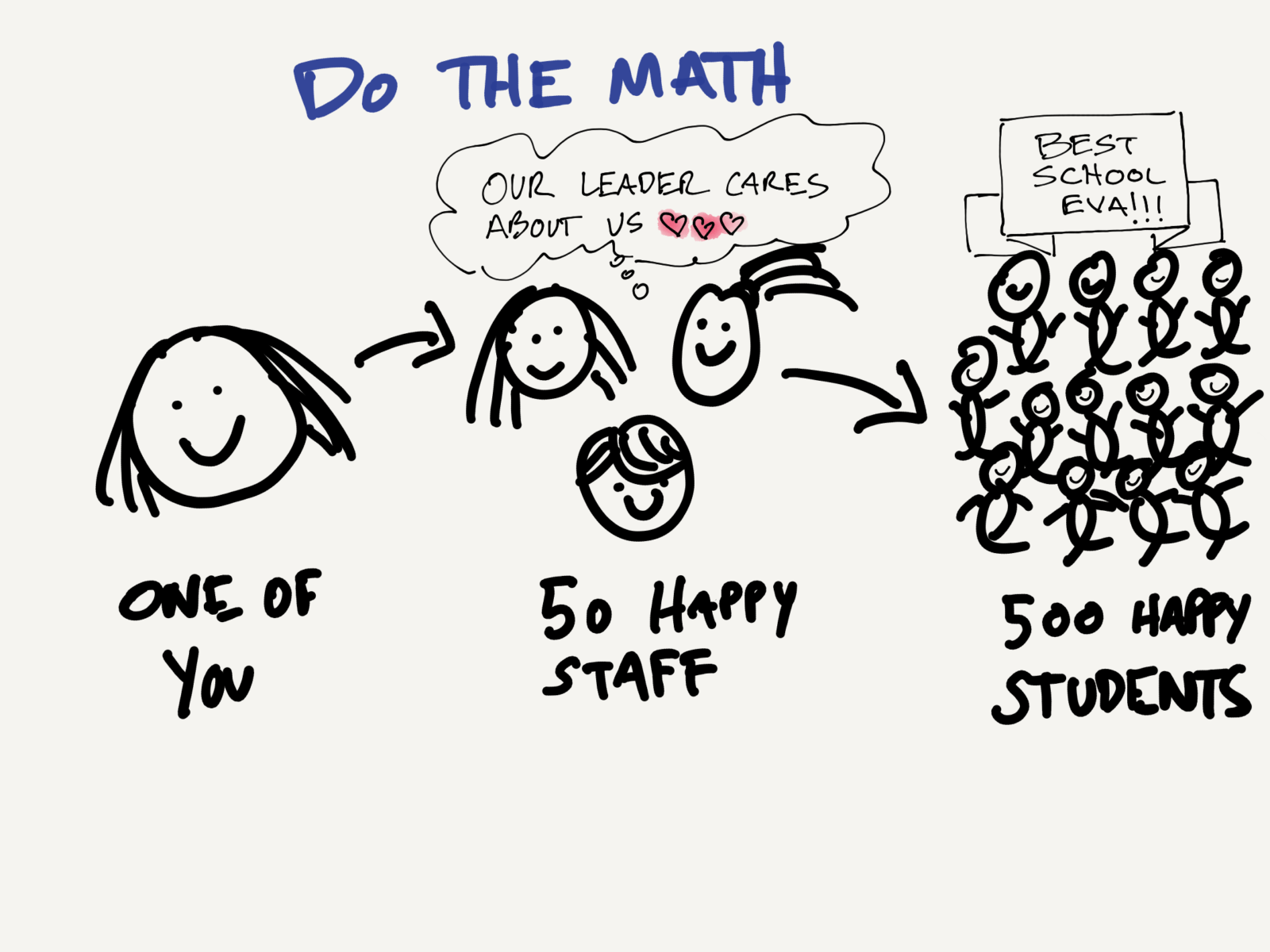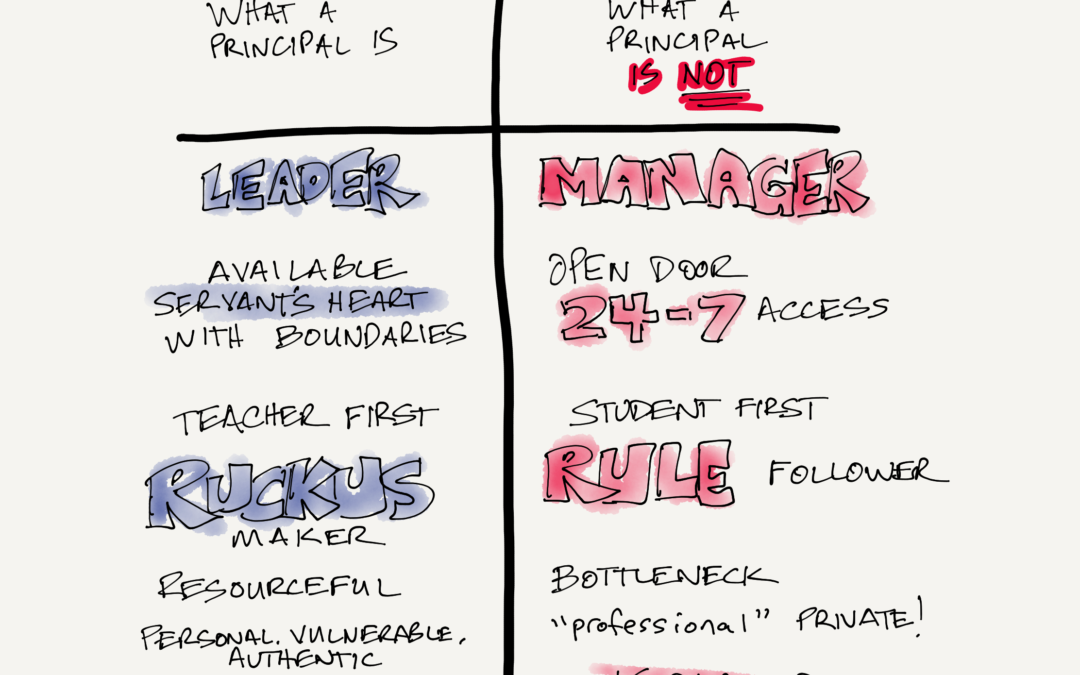This post is a list of tips for new (and aspiring) principals. And if you’re a veteran, the list serves as a great reminder to do what works in leadership.
Managers vs Leaders.
I heard this on a podcast recently and I love it: Managers give answers, leaders ask questions.
Having a nameplate on your desk gives you the leadership role in name only. To live leadership out keep a curious stance with open dialogue asking lots of questions every chance you get.
This leads to understanding and trust.
There are few things more deflating than a know-it-all micro-manager. Which leads me to the next point …
Get Over Yourself, You’re Not Royalty
You are not royalty, a demi-god, or perfect in any way, shape, or form.
And that’s a good thing.
As you have grown in your profession, what got you there is your ability to do outstanding work, often earning accolades along the way.
But now it’s about the team and organization. It’s not about you.
Look for ways to promote your people. Do it positively, in public, and often.
Since you’re not a demi-god, you’re off the hook of knowing everything.
The imposter syndrome is real. Many of us struggle with a nagging negative narrative: what will happen when they find out about the “real” me?
This narrative is rooted in fear, not truth.
What you should be scared of is acting as if you know everything and then making a decision that will harm the organization.
I’d rather ask the “stupid” question and understand the situation rather than fake it and move forward without all the facts.
One way to make better decisions is to rely on mental models. You can read on that topic here.
Break the Bottleneck
Like the ego problem noted above, if you think you’re a king or queen you probably also think you can do everything better than everyone else.
Maybe this is so.
But if you have a teammate able to do what you can do at 80% of your capacity, how much more can you get done by utilizing their efforts?
Often leaders become bottlenecks because they are too involved. It’s better to cast vision, train, provide feedback, and trust your people to bring their best effort.
Effective school principals look for ways to provide resources, training, and remove roadblocks.
Ineffective leaders are a bottleneck where great projects go to die.
Provide an express lane for your people to thrive. Don’t make them drive in bumper-to-bumper traffic.
An “Open Door Policy” is Dumb
This is the first of two controversial points I’m going to make. I beg you to stop being so accessible.
The best leaders are servant leaders, but I often tell the leaders I coach:
You can’t pour from an empty cup.
It feels good to be available. If we’re really honest, it feels great to be needed and to help answer questions or provide direction for others. If we’re always available we’re also able to hide from important and difficult work (with an embedded excuse for why we’re not getting the real work done).
Being accessible 24-7 leaves leaders burnt-out and less effective than they could be. After all, if you’re always available, when are you doing work that only you can do?
Think about it this way … which has a cleaner kitchen: the 24-7 McDonalds or the breakfast diner that’s open 6 am-2 pm daily?
A few action steps you can take right now:
- Choose when your door is open and when you’ll have deep work sessions without interruption.
- Take email off your phone and schedule when you’ll check it during the day.
- Get intentional about self-care. What do you need to do on a weekly basis to recharge? Many leaders serve everyone at a high level except themselves. It’s okay to prioritize yourself first.
Need help building an ideal week?
I’ve built a free video course that teaches leaders how to prioritize themselves and add more value to their organization.

You’ll NEVER Get to Know the Real Me
I mentioned the imposter syndrome above. This often motivates people to put up walls. Brené Brown calls this armored leadership.
Another mistake leaders believe is that “professional” means keeping your private life out of your work. Wrong again.
Making connections, building relationships, and fostering trust requires leaders to blend the private and the professional.
We are humans. Act like it.
Your community wants to know what your passions are: What books are you reading? What are you excited about? Better yet, what keeps you up at night?
Open up a bit so that those you serve can connect with you.
Put Your People First
Here is my second controversial assertion: be a staff first, kids second principal.
If you hop online, it’s definitely more popular to be a kids-first principal.
I don’t mean that kids aren’t important or that kids don’t deserve it.
What I mean is a logical conclusion that works for the most effective leaders.


Seth Godin on the future of education.
There is only of you. Even if you’re the most amazing champion for kids, you can’t be there for all of them.
If you see and serve your students before your staff, then you risk creating distance between you and your staff.
On the other hand, if you radically love, see, and serve your staff, then they will radically love, see, and serve your students.
It’s simple math.
But Daniel … I serve my staff and prioritize them and it’s not benefitting the kids …
Then choose new members for your staff.
I’m not suggesting that we create policies that benefit the staff over students. That is an inappropriate lens in which to view school policy.
What I am saying is do the math.
If your staff feels like they work in an amazing school where they are truly cared for, most of the time the students will benefit.
If you’re ready to show your staff some appreciation, this popular post is for you.
Make a Ruckus
I’ve been creating a podcast for school leaders since 2015. The tribe of listeners are called Ruckus Makers.
They are not rule-followers or yes-men.
Instead, Ruckus Makers:
- Break free from the status-quo
- Make change happen
- Never, ever give up
Many intellectuals believe education needs a shake-up. The leaders that will lead that charge are ruckus makers.
How should we shake up education?.
Here is Sir Ken Robinson on schools killing creativity.
Seth Godin on the future of education.
Isolation Is the Enemy of Excellence
Leading in isolation is a terrible choice. Leaders make the worst decisions on their own.
They say two heads are better than one for a reason.
So why do we lead in isolation?
I think leaders find it difficult to admit where they’re wrong, scared, or don’t know what to do next.
If we admit our vulnerability to our staff we fear that they will lose confidence in us.
We’re afraid of asking our key leaders for help because someone might betray us or plot our downfall.
We’re hesitant to reach out for help at central office because of a fear that it will impact our evaluation or that the district will move on without us on the team.
But what if a community existed for school leaders where they could grow alongside other driven school leaders?
What if there was a community where people could express radical candor and be challenged to level up?
What if every school principal had a personal board of directors to run decisions by and create better plans?
That community exists. We call it “The Mastermind.” You can read about and apply to our world-class leadership community here.
Stop leading in isolation. Lead within a thriving community of school leaders from around the world.
If you enjoyed what you read, please share the post on your fav social channel …
Learn how to celebrate your entire staff every month in a meaningful way. Get the guide, survey template, and coaching video FREE.
What Should You Read Next?
- Here is a list of books all school principals should read.
- Effective school principals master emotional intelligence. Start here to build your self-awareness.
- 10 quotes for school leaders.
- 5 secrets every principal should know about leadership development.
- A great way to start your next faculty meeting.
A wonderful follow-up to this post is this article, “5 Key Responsibilities – The School Principal as Leader,” by the Wallace Foundation.
Learn how to celebrate your entire staff every month in a meaningful way. Get the guide, survey template, and coaching video FREE.



